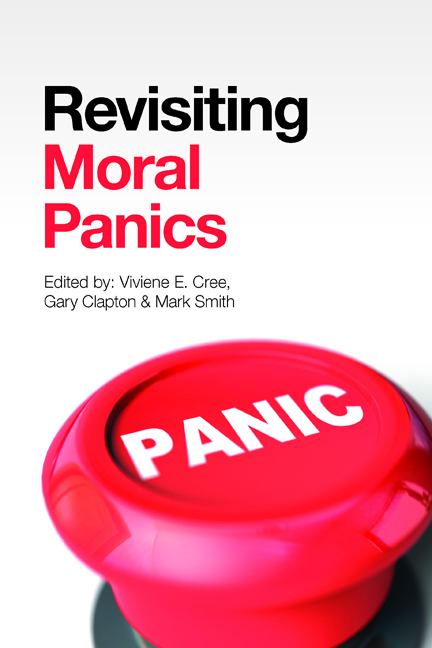Book contents
- Frontmatter
- Contents
- Contributors
- Preface
- Commentary moral panics yesterday, today and tomorrow
- Part One Gender and the family
- Part Two Moral panics in our time? Childhood and youth
- Part Three The state, government and citizens
- Part Four Moral crusades, moral regulation and morality
- Afterword the moral in moral panics
- Conclusion Moral panics and beyond
- Index
Nineteen - Integration, exclusion and the moral ‘othering’ of Roma migrant communities in Britain
Published online by Cambridge University Press: 08 March 2022
- Frontmatter
- Contents
- Contributors
- Preface
- Commentary moral panics yesterday, today and tomorrow
- Part One Gender and the family
- Part Two Moral panics in our time? Childhood and youth
- Part Three The state, government and citizens
- Part Four Moral crusades, moral regulation and morality
- Afterword the moral in moral panics
- Conclusion Moral panics and beyond
- Index
Summary
Introduction
What we can see is the moral panic spinning out of control around child abduction in Roma communities … It is demonising not only the Roma in Greece, but will affect the communities here, including Gypsies. It is playing into the view of Gypsies and Roma as child stealers … You can have one suspected case that leads to the headlines that we have seen. People are speculating about massive abduction rings for begging. (Katharine Quarmby interviewed on Channel 4 News, 22 October 2013)
What happens when two different, but related, moral panics collide? When prejudice and hysteria join forces? What impact does racial profiling have on those communities who find themselves in the crosshairs of the state? In late 2013, various central and Eastern European Roma (‘Gypsy’) communities living in Britain faced an unwelcome and overtly hostile media spotlight. Politicians openly spoke about needing to ‘change’ the ‘behaviour and culture’ of Roma migrants who were allegedly behaving in ‘intimidating’ and ‘offensive’ ways. Such views were espoused not by marginalised and disgruntled Tory backbenchers but a former Labour Home Secretary (David Blunkett, MP) and the current (at the time of writing) Deputy Prime Minister (Nick Clegg, MP). This moral panic largely centred around themes of integration, asociality and behaviour but also overlapped and merged with existing media and political attention on allegations of Roma being involved in child abduction – initially the case of ‘Maria’ in Greece and two later cases in Ireland. Roma ‘behaviour and culture’, viewed in highly static, essentialist, almost colonial terms,could only do right in doing wrong and was presented as being in direct contrast to equally static and unproblematically reified ‘British values’. At the local level, accusations of ‘antisocial’ behaviour were direct and forceful: mainly around ‘loitering’ on street corners, rubbish disposal, noise, criminal activity and sanitation issues. Tabloid and broadsheet media features appeared targeting mainly Slovak and Romanian Roma communities living in Sheffield, Glasgow and Manchester. Roma people, as an undifferentiated whole, were castigated as the nightmarish, ‘backward’, antisocial ‘neighbours from hell’ that no one wanted to live beside. Although this particular moral panic was fortunately brief, it arose out of a well-established anti-Roma history and tradition and has left its mark on present and most likely future community relations.
- Type
- Chapter
- Information
- Revisiting Moral Panics , pp. 231 - 242Publisher: Bristol University PressPrint publication year: 2015

